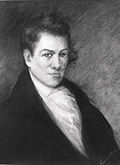| |||||||||||||||||
| |||||||||||||||||
 County results Pickens: 50–60% 60–70% 70–80% 80–90% >90% Chambers: 50–60% 60–70% 80–90% Unknown/No Vote: | |||||||||||||||||
| |||||||||||||||||
This article relies largely or entirely on a single source .(June 2025) |
| Elections in Alabama |
|---|
 |
The 1821 Alabama gubernatorial election was held on August 6, 1821, to elect the third governor of Alabama. Democratic-Republican candidate Israel Pickens defeated fellow Democratic-Republican candidate Henry H. Chambers with 57.43% of the vote.

